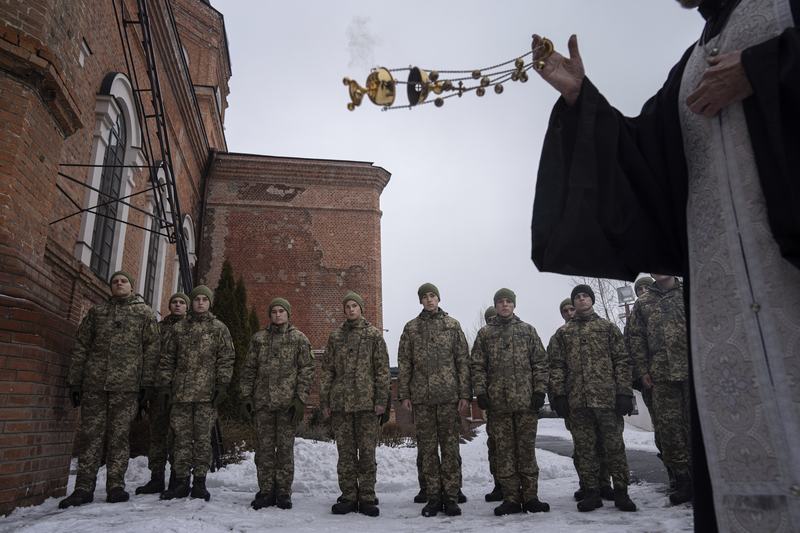Melissa Harris-Perry: This is The Takeaway. I'm Melissa Harris-Perry. On Wednesday, White House officials announced they will send 3,000 troops to NATO allies in Eastern Europe. Here's Pentagon Press Secretary, John Kirby.
John Kirby: The United States will soon move additional forces to Romania, Poland, and Germany. I want to be very clear about something. These are not permanent moves. They are moves designed to respond to the current security environment. Moreover, these forces are not going to fight in Ukraine.
Melissa Harris-Perry: Now, this is an announcement that comes as Russia continues to build up its military near Ukraine. Here to give us the latest is Nahal Toosi, Senior Correspondent for Foreign Affairs at Politico. Welcome back, Nahal.
Nahal Toosi: Thanks for having me.
Melissa Harris-Perry: All right. For me, hearing that personnel were being sent, felt like now we've moved to a new place. Can you explain what this means relative to these ongoing tensions?
Nahal Toosi: Sometimes it does feel like we're at a different place now. These troops are meant to serve as a deterrent to Russia, another signal that the United States really doesn't want Russia to invade Ukraine but that we are going to have people in nearby countries to prevent any spillover into NATO allies, essentially.
At the same time, it's a risky thing because the Russians are already making it sound like these US troop deployments are a provocation to that. The question is, are we going to keep escalating further, or is at some point Russia, or I guess maybe the US, but Russia mainly because they're the ones with 100,000 troops along the Ukraine border, going to step back and deescalate the situation.
Melissa Harris-Perry: The day before this announcement, there were multiple headlines across American media saying the one option that was off the table that no one in either party had a stomach for, was actually the involvement of troops, that whatever else happened that was not going to happen. Then 3,000. Now, 3,000 is relatively small, particularly compared to 100,000, but I'm wondering what the either political or strategic calculation was here that shifted the White House's position on that.
Nahal Toosi: The position that the White House has taken is that US troops will not go fight in Ukraine against Russia. We're not going to put the US troops in the direct line of fire, but we're sending these troops to neighboring countries, NATO allies. Again, as a signal to Putin that, look, whatever you do, you cannot cross into a NATO ally. You cannot cause any spill over into these other of countries.
Also, the hope is that with the US and the Westen Europe have unified against Russia, that Putin will think twice and back down off of Ukraine as well. I will say that the decision to send these troops is being taken in some corners even in the GOP as an unnecessary move and that maybe it could lead to, again, escalation by the Russians who might use it as a provocation.
Melissa Harris-Perry: I'm wondering, as you were saying, the hope is that it would move to de-escalation because Putin would think twice. I'm just wondering, in the reporting and following of Putin that you've seen, does he seem predisposed towards backing down when facing something like this?
Nahal Toosi: My sense is no. He has certainly invested a lot of people, a lot of time, resources, energy, into this troop buildup along Ukraine. He has recently, just the other day, was saying that the US has not addressed Russia's concerns about NATO's expansion and the threat that he supposedly feels about the NATO expansion.
It's hard to imagine that he won't do something. Now, is it going to be like an all out invasion of Ukraine? Maybe not, maybe it might just be a limited incursion or he might try to make moves on the cyber front and other realms that fall short of what we traditionally know is war.
Frankly, that can be really confusing to the United States and its allies because then it's like, well, if he's just staging cyber attacks, we need to impose all these sanctions. Putin is a former KGB guy and he's a master at this thing. At the same time, it's possible he hasn't made up his mind yet. Trying to psychoanalyze the guy is pretty tough. I don't know a lot of people who do it well.
Melissa Harris-Perry: That is a very, very fair point. Nahal Toosi is Senior Correspondent for Foreign Affairs at Politico. Thank you for joining us.
Nahal Toosi: Thank you.
Copyright © 2022 New York Public Radio. All rights reserved. Visit our website terms of use at www.wnyc.org for further information.
New York Public Radio transcripts are created on a rush deadline, often by contractors. This text may not be in its final form and may be updated or revised in the future. Accuracy and availability may vary. The authoritative record of New York Public Radio’s programming is the audio record.




